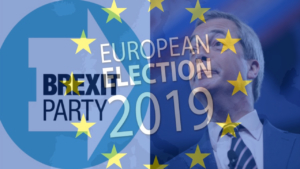
Today, seventy-three members, known as MEPs, will be elected in nine constituencies in England, and one each in Scotland, Wales and Northern Ireland. Polling stations in the UK are open until 22:00 BST.
The Netherlands is also voting today while voting in other EU nations will take place at various times over the next three days.
The results will be announced once all EU nations have voted, with the voting process expected to be completed by 22:00 BST on Sunday.
The latest opinion polls suggest that of the 73 seats they are expected to fall to the following parties:
Brexit Party: 25 seats
Labour: 15 seats
Lib Dems: 12 seats
Conservatives: 7 seats
Greens: 5 seats
SNP: 3 seats
ChangeUK: 1 seat
UKIP: 1 seat
Plaid Cymru: 1 seat
Sinn Fein: 1 seat
DUP (Democratic Unionist Party): 1 seat
UUP (Ulster Unionist Party): 1 seat
What is so surprising is that, the Brexit Party, expected to gain the majority of seats, did not exist a few months ago – and is the re-incarnation of Nigel Farage – the former leader of UKIP, a Party’s whose fortunes are now expected to collapse as a result of Farage’s new Phoenix.
Anyone who follows British Politics will be aware that the BREXIT Party exists solely because of the mess the UK Government has caused in attempting to agree a BREXIT plan from the European Union (and failing).
This has created an opportunity for a Party like the Brexit Party, not only to dominate the European elections, but also potentially any general or local elections moving forward. If ever Farage needed a political gift horse, the British establishment not only gave him one but wrapped it in a gold ribbon as well.
So how does this affect the British Prime Minister Theresa May?
Well Euro elections in truth have little effect on the Governance of the Country, as those who know anything about how the EU operates, is aware, that the European Parliament is more of a talking shop that a decision-making body.
However, a wipe out of the Conservatives at this election will undoubtedly indicate that the British Prime Minister will have to go and soon.
The Times Newspaper and other local media are betting on an announcement tomorrow, others suggest that she will wait until after the official release of European Parliament election results on Sunday.
Today however we may see the resignations of more cabinet ministers as they leave a sinking ship and position themselves for the leadership battle ahead.
For Theresa May, the personal stakes are that she will have broken a promise to deliver Brexit and so will have left behind her a devastatingly empty legacy; but the real question now is who will lead the country next and what Brexit will emerge.
With Theresa May having failed to get a negotiated deal through the House of Commons, Britain is now potentially facing a ‘no-deal Brexit’ or a ‘no Brexit at all’ scenario.
If we assume that May is replaced by someone advocating a harder Brexit – say, Boris Johnson – the next step would be for him to go to Brussels and demand a renegotiation. If, as many expect, the EU gives him short shrift, his default position would then be to wield a no-deal Brexit as a threat.
The only problem with this scenario is that the British Parliament has ruled out a no-deal Brexit on more than one occasion – so their next move might have to be getting a brand new Parliament via a general election which, potentially may indeed lead, depending who wins, to another referendum on Brexit being put forward to the British people.
This possibility has already seen the pound sterling fall to $1.26 compared with $1.31 just two weeks ago and down from $1.46 prior to the Brexit Referendum Vote on 23rd June 2016. Sterling is now standing at a 4-month low. Similarly, against the Euro the pound is down to 1.13 Euros compared with 1.17 of two weeks ago and 1.31 compared with just prior to the Referendum Vote.
Three weeks ago, gold prices stood at £971 and today they are £1010 an ounce, some 4% higher whereas in US dollar terms it’s just half percent higher over the same period.
Most stock markets were down yesterday and so far, today, and Wall Street is again expected to open lower, especially as the Fed minutes, which signalled rates would be on hold “for some time” as officials “patiently” assess incoming data.
Most Fed officials also seemed to agree that recent weakening in inflation is due to “transitory” factors, so there is little hope of a rate cut any time soon as we have previously highlighted.
So, the dollar is approaching a one-month high against G10 currencies (though it’s weaker versus the yen) while Treasury yields are also down.
We can therefore expect, if the election results pan out as the polls anticipate, some turmoil in Europe and especially the UK, with sterling falling further and the Euro falling too against the US dollar, which just supports our contention that a further strengthening of the dollar against other currencies is likely to continue for some time into the future.
Interesting times ahead – what are your thoughts?


Leave A Comment
You must be logged in to post a comment.